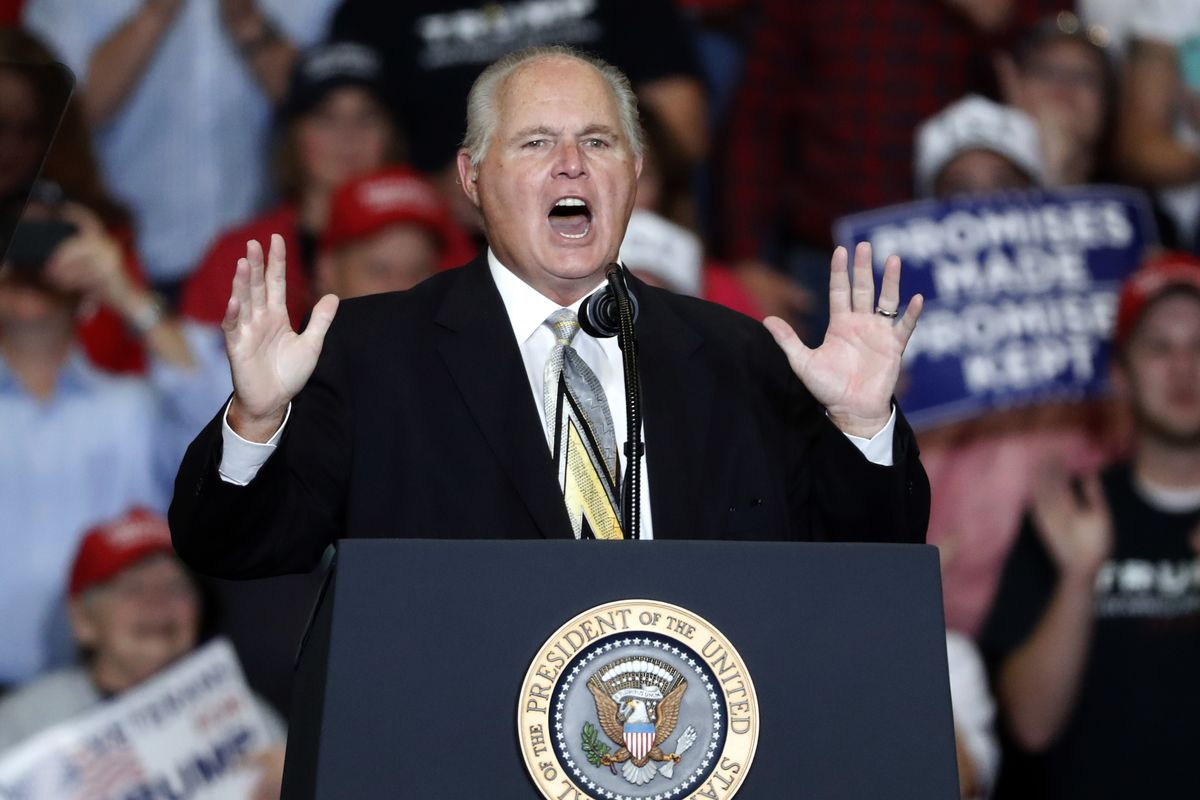Rush Limbaugh’s emotional appeal to his audience changed American politics, radio

The strong emotional response to the death Wednesday of radio personality Rush Limbaugh is no accident, local experts said.
“He knew how to juice the brains of conservatives,” said Paul Bolls, associate dean of research and graduate studies at Washington State University’s Murrow College of Communications whose work focuses on the effect of media on the human mind.
Limbaugh’s long career in radio was due to his ability to speak directly and with emotionally charged language to an audience that not only sought information, but was looking to be entertained, local fans and radio professionals said Wednesday. His blend of conservative talk radio effortlessly tapped into the psyche of political conservatives, but it also gave birth to the spread of conspiracy theories and personal attacks that have become commonplace in modern American political discourse.
Mike Fitzsimmons, the longtime local radio host who at times occupied the airwaves in competition with Limbaugh, said his voice resonated with those who saw politicians and other pundits as disingenuous.
“He would cajole his audience, he would tease his audience, he would point out the ironies in things that were occurring,” Fitzsimmons said. “The kinds of things that the news media didn’t point out.”
While to Fitzsimmons the national radio host would sound cerebral and contemplative in a way that also entertained, others saw his persona differently.
Limbaugh could seem nonthreatening and even “buffoonish,” said Rebecca Mack, a former local radio producer for KXLY and KYRS.
“He seemed sort of laughable, almost like Foghorn Leghorn,” said Mack, who made a point to say she didn’t agree with Limbaugh’s ideology. “But it resonated, that kind of extreme speech.”
Mack said Limbaugh appeared as an ideologue, a term she didn’t use to describe her on-air partner Mark Fuhrman, the former Los Angeles police detective with whom she hosted an AM radio program in the 2000s.
“As much as I’m not a fan of Rush Limbaugh, I believe people should be able to hear all voices,” Mack said.

Listeners would tune in to Limbaugh’s show, which aired locally on 590-AM, because his voice sounded more like theirs than others on the dial.
“Rush, as far as I was concerned, more often than not hit the nail on the head when he wasn’t patting himself on the back,” said George McGrath, the Spokane resident who in recent years has become a frequent critic of the Spokane City Council’s progressive majority.
McGrath said it was affirming to hear that Limbaugh agreed with him, but wasn’t necessary for his enjoyment of the show.
“If he and I did not agree, then he was wrong, of course,” McGrath said. But that was “not real often.”
Fitzsimmons agreed that Limbaugh’s appeal was not predicated on the audience agreeing with him, noting that liberal listeners would also tune in to get a sense of the conservative mindset, and also to challenge the host’s position.
“He was able to give people a fresh perspective. Whether they agreed with him or not wasn’t really all that important,” Fitzsimmons said.
For a younger generation of conservatives, Limbaugh became a voice of authority on the radio after his show became nationally syndicated in the late 1980s, said Michael Baumgartner, a former Republican state senator and current Spokane County treasurer.
“Rush was on the air so much, I know people that criticize him, can pick out things he said,” Baumgartner said. “Sometimes he could be a little rough around the edges.”
What some on the conservative spectrum may have seen as rough, others saw as misogynistic and racist. Limbaugh pushed the false “birther” narrative against former President Barack Obama, one of the many ties political commentators on Wednesday linked to former President Donald Trump.
“If we can point to one of the downfalls of how we ended up with conspiracy theories, he’s one of the rungs of the ladder that people climbed to get here,” former City Council President Ben Stuckart said.
Mack noted that his was one of the voices that helped amplify the beliefs that led to a storming of the United States Capitol on Jan. 6 in an effort to overturn the presidential election. When a voice becomes “that dominant, that influential, that destructive,” she said, the political discourse could benefit from its absence.
A national radio career spanning three decades shows how in-tune Limbaugh was with his audience, Bolls said, and an understanding that radio is “the theater of the mind,” most effective when it plays on the strong emotions of its audience.
“You appeal to raw emotions, and you’re going to build a dedicated fanbase,” he said.